Daily Vocabulary Words: List of Daily Used Words in Leading International Newspapers
Hi there. Welcome to this special section @ Wordpandit.
Our endeavour here is very simple: to highlight important daily vocabulary words, which you would come across in leading newspapers in the country. We have included the following newspapers in our selection:
• The New York Times
• The Washington Post
• Scientific American
• BBC
• The Guardian
• Psychology Today
• Wall Street Journal
• The Economist
We are putting in extensive work for developing your vocabulary. All you have got to do is be regular with this section and check out this post on a daily basis. This is your repository of words that are commonly used and essentially, we are posting a list of daily used words. Hence, this has significant practical application as it teaches you words that are used commonly in leading publications mentioned above.
Visit the website daily to learn words from leading international newspapers.
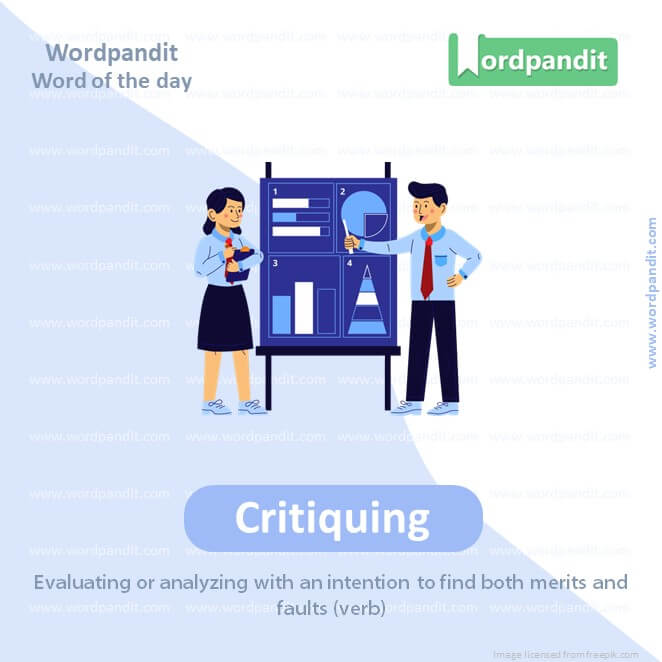
WORD-1: Critiquing
CONTEXT: the scientists or mathematicians whose practice he was critiquing would pay any mind to what he said. “
SOURCE: Guardian
EXPLANATORY PARAGRAPH: Critiquing is like when you look at your drawing and talk about what parts are really good and what parts you could make better next time. It means giving your opinion about something, especially what you like and what could be improved.
MEANING: Evaluating or analyzing with an intention to find both merits and faults (verb)
PRONUNCIATION: kri-teek-ing
SYNONYMS: Analyzing, evaluating, assessing, reviewing, appraising
USAGE EXAMPLE:
1. She spent the afternoon critiquing the students’ art projects.
2. The teacher is critiquing our essays for the final exam.
3. He enjoys critiquing movies as a hobby.
4. The author welcomed the critiquing of her manuscript by the editor.
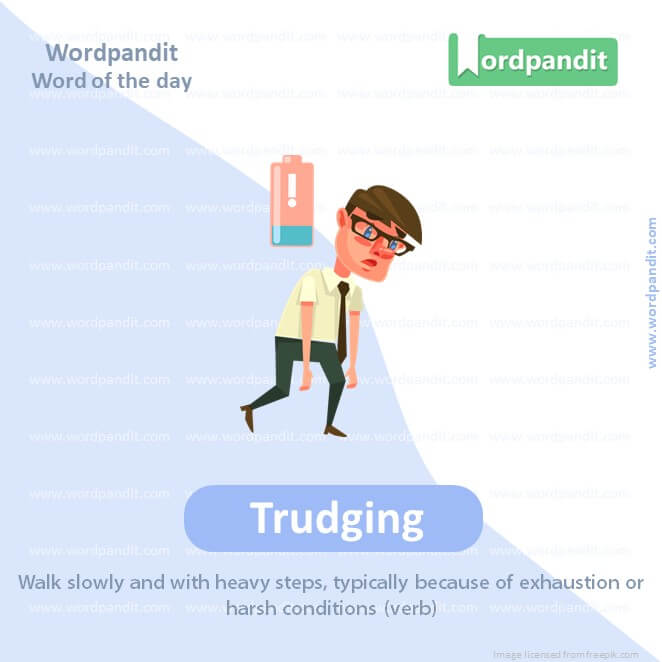
WORD-2: Trudging
CONTEXT: we must imagine someone (Wittgenstein) hiking 40 minutes or so from Trinity College to Cambridge’s conspicuously nowhere-near-the-centre train station, only to be nudged by a poster into trudging the whole way home.
SOURCE: Guardian
EXPLANATORY PARAGRAPH: Trudging is like when you’re walking really slowly because you’re tired or carrying something heavy, like when you walk through mud and it feels hard to lift your feet. It means walking slowly with effort.
MEANING: Walk slowly and with heavy steps, typically because of exhaustion or harsh conditions (verb)
PRONUNCIATION: truhj-ing
SYNONYMS: Plodding, lumbering, slogging, dragging, schlepping
USAGE EXAMPLE:
1. After the long hike, they were trudging back home, exhausted.
2. He was trudging through the snow to get to school.
3. They trudged up the hill with their heavy backpacks.
4. She trudged to the bus stop in the pouring rain.
WORD-3: Conspicuously
CONTEXT: we must imagine someone (Wittgenstein) hiking 40 minutes or so from Trinity College to Cambridge’s conspicuously nowhere-near-the-centre train station, only to be nudged by a poster into trudging the whole way home.
SOURCE: Guardian
EXPLANATORY PARAGRAPH: Conspicuously is like when you wear a big, bright, sparkly hat to school and everyone can see you easily because you stand out. It means being very easy to see or notice, usually because you are different or unusual.
MEANING: In a clearly visible way; standing out so as to be clearly visible (adverb)
PRONUNCIATION: kun-spi-kew-us-lee
SYNONYMS: Obviously, clearly, notably, prominently, distinctly
USAGE EXAMPLE:
1. He was conspicuously absent from the meeting.
2. The award stood conspicuously on the mantle.
3. She was conspicuously dressed in a bright red dress at the party.
4. His talent was conspicuously superior to others in the competition.
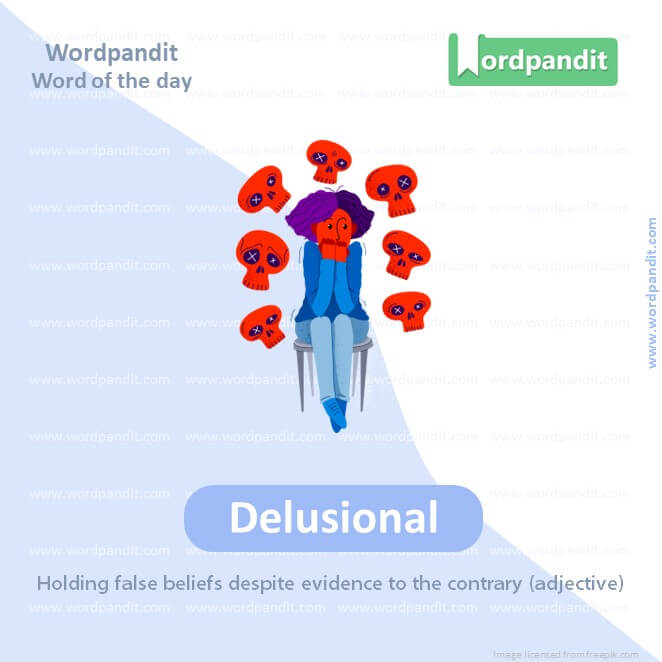
WORD-4: Delusion
CONTEXT: adverts are telling us to be similarly careful – but only so we can try to maintain the delusion that we still have a functioning economy.
SOURCE: Guardian
EXPLANATORY PARAGRAPH: Delusion is like when you believe something is real, like a monster under the bed, but it’s actually just in your imagination. It means thinking something is true even though it’s not.
MEANING: Holding false beliefs despite evidence to the contrary (adjective)
PRONUNCIATION: dih-loo-zhuhn
SYNONYMS: Misbelief, misconception, fallacy, illusion, fantasy
USAGE EXAMPLE:
1. He was under the delusion that he could easily pass the exam without studying.
2. The idea that the earth is flat is a delusion.
3. Her delusion of being followed made her anxious.
4. The patient suffered from delusions of grandeur.
WORD-5: Disembodied
CONTEXT: Keir Starmer’s Kitchener-esque head pointing a disembodied finger at the viewer: “Britain wants YOU … to arrest and imprison anyone you suspect of petty crime.”
SOURCE: Guardian
EXPLANATORY PARAGRAPH: Disembodied is like hearing a voice without seeing the person who is speaking, kind of like when you hear someone talk on the phone. It means something is separated from or existing without a body.
MEANING: Separated from or existing without the body; not physically present (adjective)
PRONUNCIATION: dis-em-bod-eed
SYNONYMS: Bodiless, spectral, ethereal, incorporeal, unembodied
USAGE EXAMPLE:
1. They heard a disembodied voice echoing in the hall.
2. The ghostly figure appeared as a disembodied spirit.
3. Disembodied sounds were coming from the attic.
4. The séance involved communication with disembodied souls.
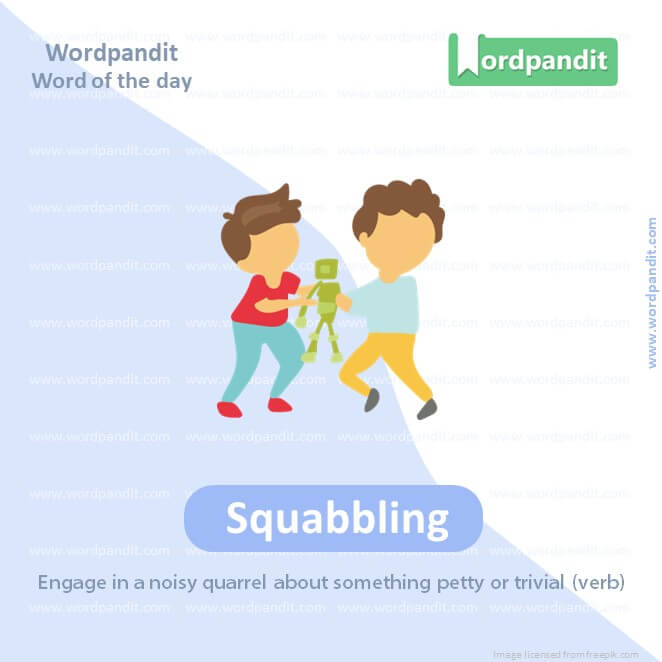
WORD-6: Squabbling
CONTEXT: There is not the remotest national advantage in another six months of bickering and squabbling.
SOURCE: Guardian
EXPLANATORY PARAGRAPH: Squabbling is like when you and your friend argue over which game to play. It means fighting or arguing over something small or not very important.
MEANING: Engage in a noisy quarrel about something petty or trivial (verb)
PRONUNCIATION: skwob-ling
SYNONYMS: Bickering, arguing, quarreling, wrangling, tiffing
USAGE EXAMPLE:
1. The children were squabbling over who would get the last piece of cake.
2. Politicians often squabble over minor issues instead of solving bigger problems.
3. The siblings squabbled throughout the car ride.
4. There was a lot of squabbling in the meeting, making it unproductive.
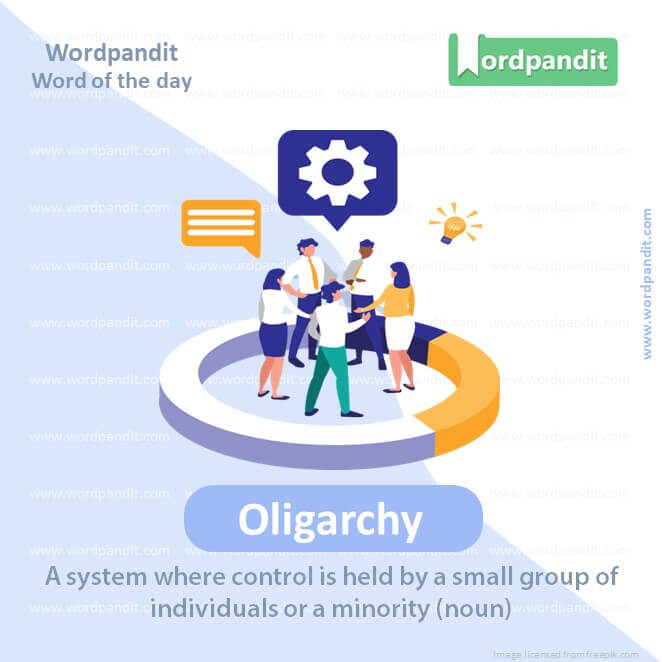
WORD-7: Oligarchy
CONTEXT: She heads the central oligarchy of power in Britain, the party of government in parliament.
SOURCE: Guardian
EXPLANATORY PARAGRAPH: Oligarchy is like when only a few people in a group get to make all the decisions, like if only two or three kids in class got to choose all the games everyone plays. It means a system where only a small group of people has all the power.
MEANING: A system where control is held by a small group of individuals or a minority (noun)
PRONUNCIATION: ol-i-gahr-kee
SYNONYMS: Elitism, plutocracy, aristocracy, junta, cabal
USAGE EXAMPLE:
1. The country was ruled by an oligarchy of wealthy businessmen.
2. The oligarchy controlled all major decisions in the city.
3. Critics argue that the new law benefits the oligarchy at the expense of the public.
4. Historically, the oligarchy had a tight grip on political power.
WORD-8: Denuded
CONTEXT: It was Johnson’s mass expulsion of such talent in 2019 – fearing for his position – that has left the party so denuded of leadership ability today.
SOURCE: Guardian
EXPLANATORY PARAGRAPH: Denuded is like when a tree loses all its leaves and stands bare without anything covering it. It means something has been stripped off everything on it, leaving it empty or exposed.
MEANING: Stripped of its covering, possessions, or assets; made bare (verb)
PRONUNCIATION: dih-nood-ed
SYNONYMS: Stripped, bared, uncovered, exposed, divested
USAGE EXAMPLE:
1. The forest was denuded after the massive fire.
2. The walls were denuded of any decorations during the renovation.
3. The hill was denuded of trees by logging companies.
4. The economic crisis left the museum denuded of funding.
WORD-9: Denunciations
CONTEXT: He supports peace and negotiations, “but on Russia’s conditions and without one step backwards” – but his platform also called for “freedom of speech and opinion, instead of intolerance and denunciations”, and “openness and pragmatism instead of searching for new enemies”.
SOURCE: Guardian
EXPLANATORY PARAGRAPH: Denunciations is like when someone tells everyone that something is really bad or wrong, like telling a teacher when someone breaks the rules. It means publicly saying that something or someone is bad or wrong.
MEANING: Public condemnation or accusation (noun)
PRONUNCIATION: deh-nun-see-ay-shuhns
SYNONYMS: Condemnations, criticisms, attacks, reproaches, accusations
USAGE EXAMPLE:
1. The politician faced denunciations for his controversial statements.
2. Activists issued denunciations against the new law.
3. The article was filled with denunciations of the company’s practices.
4. He responded calmly to the denunciations from his opponents.
WORD-10: Culmination
CONTEXT: The elections also marked the culmination of weeks of modest but consistent protest for those opposed to Putin.
SOURCE: Guardian
EXPLANATORY PARAGRAPH: Culmination is like when you’re building a tower with blocks and you finally put the last piece on top. It means reaching the end or the highest point of something after a lot of work.
MEANING: The highest or climactic point of something, especially as attained after a long time (noun)
PRONUNCIATION: kul-mi-nay-shun
SYNONYMS: Climax, peak, pinnacle, apex, zenith
USAGE EXAMPLE:
1. The project reached its culmination after years of research.
2. The culmination of the festival was the spectacular fireworks display.
3. Her career reached its culmination with the award for lifetime achievement.
4. The negotiations reached their culmination in the signing of the treaty.
vocabulary NDA
Understanding the Vocabulary NDA (Non-disclosure Agreement) is a crucial step in the world of business and law. These terms are not just a compilation of complex words, but a key to decoding legal implications that could affect your business.
Essentially, the Vocabulary NDA refers to the specific set of terms and phrases typically present in a non-disclosure agreement. Broadening your knowledge on this could significantly enhance your comprehension, allowing you to navigate the legal landscape more smoothly.
Mastering the vocabulary NDA starts by contextualizing. While it may sound highly technical, relating each term to real-world scenarios greatly facilitates one’s learning process. Realize that the words in the vocabulary NDA are not arbitrary; they align with certain legal concepts, circumstances, and proceedings.
Secondly, repetition plays an integral role. Regular exposure to the vocabulary NDA strengthens one’s memory, promoting the retention of information. Consider engaging in relevant discussions, reading articles, listening to podcasts, or even simply reviewing a non-disclosure agreement. This repetitive interaction ultimately ingrains the vocabulary NDA into one’s cognitive system.
The vocabulary NDA becomes less intimidating through practical application. It’s essential to apply these terms in actual situations – be it drafting your own NDA, or merely examining an existing one. This invites an in-depth understanding, making the vocabulary NDA more familiar and comprehensible.
Lastly, remember to continuously expand and refine the vocabulary NDA. Legal terminologies evolve, and so should your lexical prowess. Stay updated with new terms and modifications in law that could modify the existing vocabulary NDA.
To sum it up, learning the vocabulary NDA requires relatability, repetition, practical application, and continuous learning. Leverage these strategies, and break your barriers to legal fluency. Unfurl the complexities of the vocabulary NDA, for it’s a secret tool in your success arsenal.







